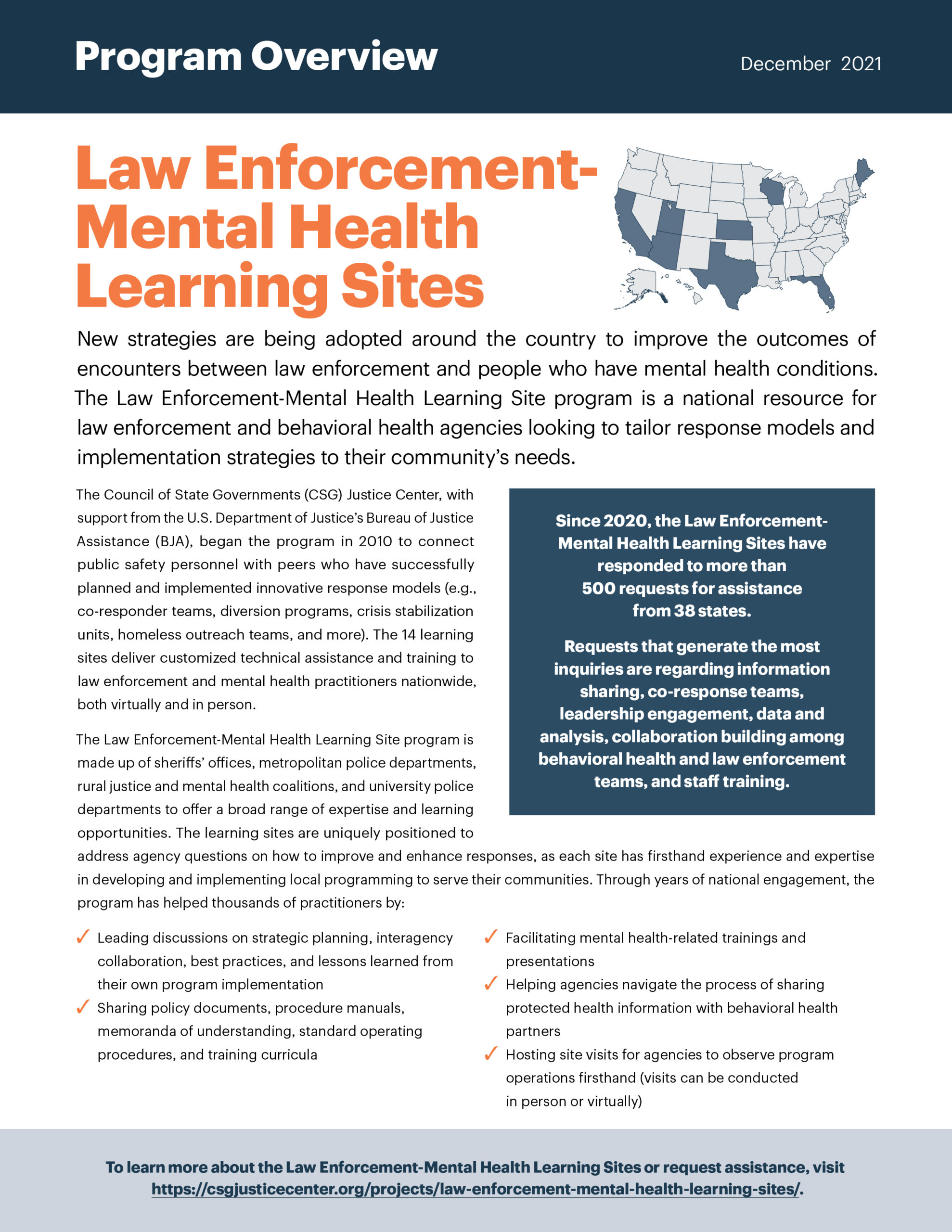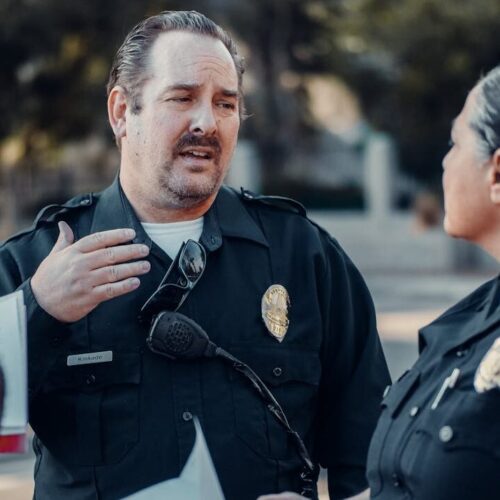Program Overview: Law Enforcement-Mental Health Learning Sites
New strategies are being adopted around the country to improve the outcomes of encounters between law enforcement and people who have mental health conditions. The Law Enforcement-Mental Health Learning Site program is a national resource for law enforcement and behavioral health agencies looking to tailor response models and implementation strategies to their community’s needs. This brief provides a detailed overview of the program.
Program Overview: Law Enforcement-Mental Health Learning Sites
New strategies are being adopted around the country to improve the outcomes of encounters between law enforcement and people who have mental health conditions. The Law Enforcement-Mental Health Learning Site program is a national resource for law enforcement and behavioral health agencies looking to tailor response models and implementation strategies to their community’s needs.
The Council of State Governments (CSG) Justice Center, with support from the U.S. Department of Justice’s Bureau of Justice Assistance (BJA), began the program in 2010 to connect public safety personnel with peers who have successfully planned and implemented innovative response models (e.g., co-responder teams, diversion programs, crisis stabilization units, homeless outreach teams, and more). The 14 learning sites deliver customized technical assistance and training to law enforcement and mental health practitioners nationwide, both virtually and in person. The Law Enforcement-Mental Health Learning Site program is made up of sheriffs’ offices, metropolitan police departments, rural justice and mental health coalitions, and university police departments to offer a broad range of expertise and learning opportunities. The learning sites are uniquely positioned to address agency questions on how to improve and enhance responses, as each site has firsthand experience and expertise in developing and implementing local programming to serve their communities. Through years of national engagement, the program has helped thousands of practitioners by:
✓ Leading discussions on strategic planning, interagency collaboration, best practices, and lessons learned from their own program implementation
✓ Sharing policy documents, procedure manuals, memoranda of understanding, standard operating procedures, and training curricula
✓ Facilitating mental health-related trainings and presentations
✓ Helping agencies navigate the process of sharing protected health information with behavioral health partners
✓ Hosting site visits for agencies to observe program operations firsthand (visits can be conducted
in person or virtually)
Since 2020, the Law Enforcement-Mental Health Learning Sites have responded to more than 500 requests for assistance from 38 states.
Requests that generate the most inquiries are regarding information sharing, co-response teams, leadership engagement, data and analysis, collaboration building among behavioral health and law enforcement teams, and staff training.
To learn more about the Law Enforcement-Mental Health Learning Sites or request assistance, visit https://csgjusticecenter.org/projects/law-enforcement-mental-health-learning-sites/.
The Law-Enforcement-Mental Health Learning Sites
Arlington, MA: The Arlington Police Department has a mental health clinician embedded in the department and operates a variety of innovative programs, including the Jail Diversion Program, Hoarding Response Team, Elder Abuse Prevention Task Force, and Arlington Opiate Outreach Initiative.
Bexar County, TX: The Bexar County Sheriff’s Office sends their Specialized Multidisciplinary Alternative Response Team (SMART) to calls with a person in crisis. SMART is made up of two teams working in tandem; one consisting of two sworn deputies, the other is staffed by an emergency medical technician and a licensed clinician.
Harris County, TX: The Harris County Sheriff’s Office operates a mobile crisis team, a co-responder unit, and a homeless outreach team. They also have the Clinician and Officer Remote Evaluation (CORE) program, which allows deputies to connect with master’s level-trained clinicians to conduct evaluations remotely.
Houston, TX: The Houston Police Department has Crisis Intervention Team-trained officers, a co-responder unit, a homeless outreach team, and runs the Chronic Consumer Stabilization Initiative. Through its partnership with the Harris Center, it embeds mental health clinicians inside the city’s dispatch center to operate the Crisis Call Diversion program.
Los Angeles, CA: The Los Angeles Police Department’s Mental Evaluation Unit includes a 24-hour triage line, co-responder units, follow-up case managers, and more. Their 40-hour Mental Health Intervention Training is given to all officers, and they also have mental health professionals embedded within the department.
Madison, WI: The Madison Police Department employs a full-time mental health team made up of officers trained as mental health liaisons and community crisis workers. They have a robust training regimen for officers and a full-time behavioral health data analyst to help improve service delivery.
Madison County, TN: The Madison County Sheriff’s Office operates a pretrial diversion program, connects people in crisis to a 24/7 crisis stabilization unit, and handles all mental health transports in the area.
Miami-Dade County, FL: The Miami-Dade Police Depart-ment’s Threat Management Section works with people who have been placed on psychiatric holds under the Baker Act, operates a co-responder unit, and through their partnership with Thriving Mind, provides ongoing case management services to people who need it.
Portland, ME: The Portland Police Department has mental health professionals embedded in the agency along with master’s level students who support them. They run a co-responder model for responding to mental health calls and are piloting a community-led response team.
Salt Lake City, UT: The Salt Lake City Police Department operates the Community Connection Center, which houses their crisis intervention team, homeless outreach team, and community connections team. The Community Connections Team consists of case managers, therapists, and law enforcement working together to address mental health calls.
Tucson, AZ: The Tucson Police Department’s Mental Health Support Team (MHST) is a co-responder unit that pairs law enforcement officers with mental health clinicians. The MHST, along with mobile crisis teams and the crisis response center, helps connect residents to local supportive services.
University of Florida: Serving roughly 80,000 students, staff, and faculty, the University of Florida Police Department utilizes intensive crisis intervention training, suicide prevention training, and more to ensure mental health calls are handled appropriately.
Wichita, KS: The Wichita Police Department has a homeless outreach team, a co-responder unit, and operates a mobile crisis team in partnership with COMCARE—described as the largest community mental health center in Kansas.
Yavapai County, AZ: The Yavapai Justice & Mental Health Coalition brought law enforcement and health care providers together to ensure that crisis response teams across the county respond to calls in 30 minutes or less. The Yavapai County Sheriff’s Office operates the Reach Out program, which connects people being released from jail with the services they need to reduce recidivism and further involvement in the justice system.
The Police Mental Health Collaboration Self-Assessment Tool is designed to provide resources to help law enforcement agencies and their behavioral health partners improve responses to calls for service for people with mental illnesses and/or co-occurring substance use conditions. To use the self-assessment tool, visit https://csgjusticecenter.org/projects/police-mental-health-collaboration-pmhc/self-assessment-tool/.
Project Credits
Writing: Ethan Aaronson, CSG Justice Center
Research: Ethan Aaronson, CSG Justice Center
Advising: Julia Kessler and Dr. Ayesha Delany-Brumsey, CSG Justice Center
Editing: Darby Baham, CSG Justice Center
Design: Michael Bierman
Public Affairs: Ruvi Lopez, CSG Justice Center
Web Development: Eleventy Group
Photo by Fred Moon on Unsplash
This brief was supported by Grant No. 2019-NT-BX-K001, awarded by the Bureau of Justice Assistance. The Bureau of Justice Assistance is a component of the Department of Justice’s Office of Justice Programs, which also includes the Bureau of Justice Statistics, the National Institute of Justice, the Office of Juvenile Justice and Justice and Delinquency Prevention, the Office for Victims of Crime, and the Office of Sex Offender Sentencing, Monitoring, Apprehending, Registering, and Tracking (SMART). Points of view or opinions in this document are those of the author and do not necessarily represent the official position or policies of the U.S. Department of Justice.
About the Author

The sharp rise in school shootings over the past 25 years has led school officials across the U.S.…
Read MoreA three-digit crisis line, 988, launched two years ago to supplement—not necessarily replace—911. Calling 988 simplifies access to…
Read MoreIt would hardly be controversial to expect an ambulance to arrive if someone called 911 for a physical…
Read More Taking the HEAT Out of Campus Crises: A Proactive Approach to College Safety
Taking the HEAT Out of Campus Crises: A Proactive Approach to College Safety
The sharp rise in school shootings over the past 25 years has…
Read More From 911 to 988: Salt Lake City’s Innovative Dispatch Diversion Program Gives More Crisis Options
From 911 to 988: Salt Lake City’s Innovative Dispatch Diversion Program Gives More Crisis Options
A three-digit crisis line, 988, launched two years ago to supplement—not necessarily…
Read More Matching Care to Need: 5 Facts on How to Improve Behavioral Health Crisis Response
Matching Care to Need: 5 Facts on How to Improve Behavioral Health Crisis Response
It would hardly be controversial to expect an ambulance to arrive if…
Read More












